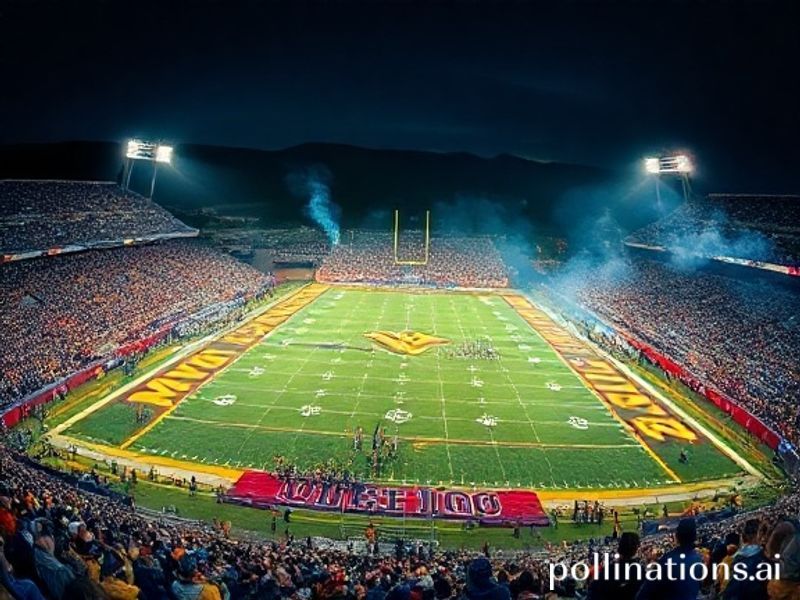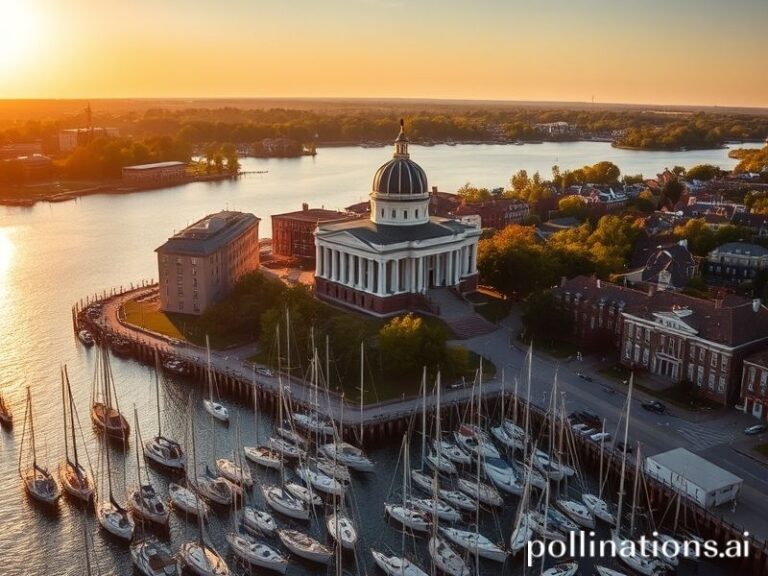West Virginia vs Ohio: Why a River Spat Between Two Rust Belt States Has the Whole World Watching (and Snickering)
West Virginia vs Ohio: A Micro-Brawl with Macro-Implications
By Our Man in the Rust Belt, filing from a motel whose Wi-Fi password is still “Covid2020!”
When the words “West Virginia” and “Ohio” appear in the same sentence, most non-Americans picture banjo music, abandoned steel plants, and a faint smell of coal dust mingling with vape smoke. To the rest of the planet—currently distracted by the slow-motion demolition derby called 2024—this Appalachian grudge match is like watching two brothers fight over the last can of beans while the house burns. Yet, as any seasoned correspondent knows, the smallest domestic spats often reveal the widest fractures in the global order. So let us dust off the irony filters and examine why a border squabble between two states whose combined GDP is roughly equal to Finland’s matters from Lagos to Lahore.
The casus belli, for those who missed the latest TikTok briefing, is the Ohio River—formerly known on medieval maps as “The Big Wet Thing Keeping West Virginians From Cincinnati Chili.” Ohio claims revised flood-plain surveys give it control of a sliver of riverbank rich in fracking brine and discarded scratch-off tickets. West Virginia, never a state to decline a fight it can’t afford, counters with nineteenth-century riverboat receipts and a 3-D printed replica of the Hatfield-McCoy fence. Both state legislatures have dispatched interns armed with Google Translate and caffeine patches to scour international law for precedents. So far they’ve located the 1998 Botswana–Namibia water ruling and, inexplicably, the Treaty of Westphalia, suggesting either ambition or desperation.
Cue the global ripple effects. China, ever alert for symbolic weakness in the American interior, has begun stockpiling metallurgical coal “just in case Appalachia descends into artisanal civil war.” Brussels, terrified that any interstate dispute might delay shipments of blue methylene glycol (used in EU-approved oat milk), has dispatched a fact-finding mission of Nordic cyclists who keep asking where the bike lanes are. Meanwhile, El Salvador’s president—bored with Bitcoin volcanoes—tweeted an offer to mediate, provided both sides adopt his national cryptocurrency and rename the river “River McRiverface ₿.”
Financial markets, those finely tuned hysteria machines, have responded with the sobriety of a cat on espresso. Futures in pepperoni rolls (West Virginia’s sovereign snack) spiked 17 %; shares in Ohio’s largest rubber-band manufacturer—vital for holding together the nation’s last functioning postal service—fell 8 %. Over in London, traders have opened a spread bet on whether the dispute will conclude (a) diplomatically, (b) via college football overtime, or (c) by both states quietly agreeing to blame Pennsylvania.
Environmentalists eye the fracas with the weary amusement of parents watching toddlers fight over a plastic straw. The Ohio River already hosts so many micro-plastic particles that fish file their own tax returns; additional dredging could release enough heavy metals to make the Rhine look like mineral water. Greenpeace has floated a barge dubbed “The Obvious Metaphor” between the warring banks, broadcasting whale songs and PowerPoint slides. Both states responded by classifying the barge as invasive fauna and taxing it.
Human nature, meanwhile, continues its undefeated streak. Each governor has posted drone footage of their side of the river looking vaguely less post-apocalyptic, soundtracked—without licensing rights—by whichever British band is cheapest on iTunes this week. Local news anchors, genetically engineered for folksiness, assure viewers that “the nation is watching,” which must come as news to the nation, currently binge-watching a Korean reality show about competitive ironing.
And so we arrive at the moral: in an era when superpowers jostle over microchips and asteroid mining rights, the West Virginia–Ohio contretemps is a quaint reminder that humans will find a way to weaponize geography even when the prize is a toxic waterway and a couple of Arby’s franchises. The planet keeps warming, supply chains keep contracting, yet we remain gloriously petty—an attribute that, perversely, unites us across cultures. Whether you’re in Kinshasa or Kansas, nothing says “civilization” quite like suing your neighbor over a soggy ditch while the oceans rise.
Conclusion: Treaties will be signed, memes will fade, and the Ohio River will keep rolling—carrying with it the flotsam of our grander delusions. Somewhere in the Hague, an intern is already drafting a footnote. History will note that when the world needed solidarity, two states instead debated which side of an imaginary line gets the polluted half. And the rest of us, weary but entertained, will mutter the ancient journalistic prayer: “May we continue to report the small wars, lest the big ones notice we’re still laughing.”







